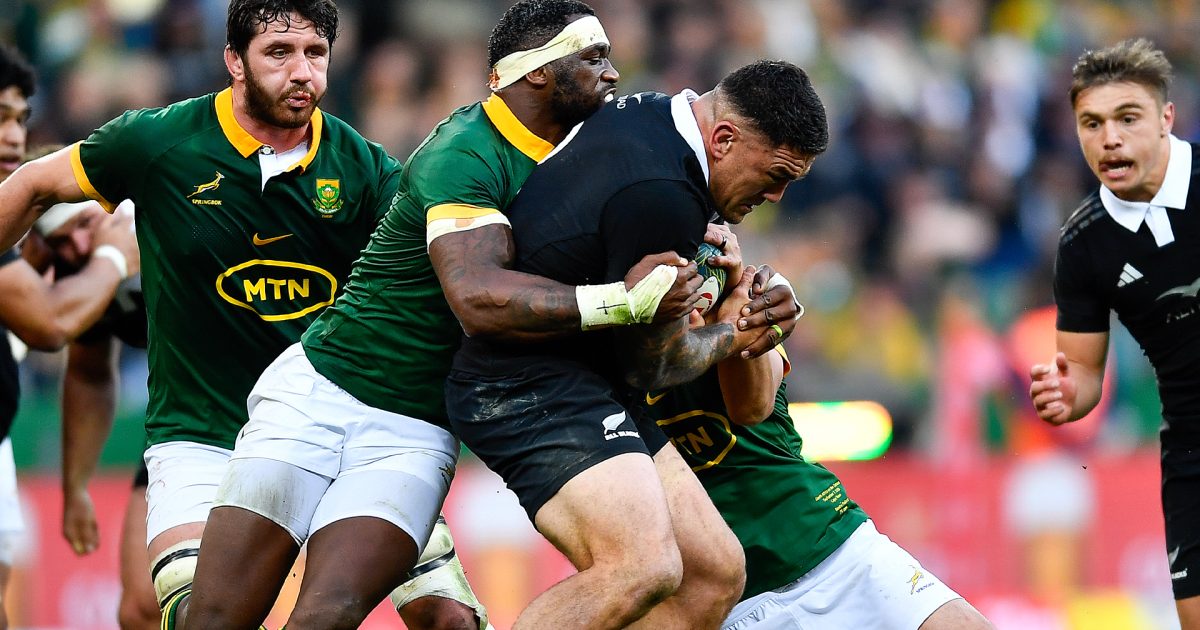
Springboks reclaim Freedom Cup in titanic All Blacks clash

DHL Stadium welcomed one of rugby’s most iconic rivalries for the first time on Saturday evening in a Rugby Championship clash that saw the Freedom Cup return to South Africa for the first time since 2009.
After a classic All Blacks vs Springboks clash one week ago in Johannesburg, fans were expectant of another mammoth tussle and the two heavyweights delivered with 80 minutes of spellbinding rugby. Ultimately, the world champs proved their character with an 18-12 win.
The All Blacks won a penalty from Jasper Wiese’s opening carry but were immediately under huge pressure from the Springbok scrum. There was plenty of sting in the hosts’ defence welcoming the All Blacks back to Cape Town.
The second scrum of the game saw the Springboks flex their muscles and win a penalty. Rapid play ensued with heavy contact and possession spilling both ways. The All Blacks disrupted both of the Springboks’ opening lineouts.
When the All Blacks strung some phases together on attack it was dangerous with the ball swinging from flank to flank, but the world champs’ character shone through with a clutch breakdown turnover.
It was exactly the kind of lung-busting intensity that made round three’s matchup so enthralling, and New Zealand soon pressed deep into Springbok territory once more.
This time, the break from Codie Taylor resulted in a yellow card to Wiese, and Damian McKenzie lined up the penalty to give the visitors a 3-0 lead 15 minutes in.
Before the Kiwis could capitalise on their one-man advantage, Sevu Reece was handed a yellow card for a dangerous aerial challenge.
A stolen lineout saw Cheslin Kolbe break a handful of tackles and make it 10 metres from the All Blacks line, but the offload was knocked forward and the visitors cleared off the back of a strong scrum.
The South African attack was ambitious with offloads and real intent to play at pace, showing new attack coach Tony Brown’s DNA taking hold.
The hosts turned down a certain three points and went to the corner following a ruck infringement by Ardie Savea, but couldn’t find their way through or around the Kiwi maul defence, having possession stolen three phases later.
As the half-hour mark approached, the Springboks gave away a penalty for not rolling and McKenzie stepped up to extend the All Blacks lead to six.
When the next Springbok penalty was awarded, Handre Pollard opted for a shot at the posts and got his team on the scoreboard.
With half-time nearing, the All Blacks made their way into Springbok territory the hard way with gruelling phase play and just as the hosts looked to have produced another clutch steal, they were penalised and McKenzie sent his side into the break with a 9-3 lead.
McKenzie had a chance to start the half on a high for the visitors when he stepped up for a 55-metre drive at the posts but the kick fell short.
The hosts then had their chance with the ball in hand and looked revitalised attacking the contact area. Every Springbok was hitting the ball with pace and challenging the All Black line until Eben Etzebeth gambled on a stretch at the try line and came up short.
Playing under advantage, the South Africans went to the corner twice more and while they couldn’t break their opponents’ maul defence, Siya Kolisi powered over the try line just a couple of phases into the play. The conversion handed the Springboks their first lead of the game and made the world champs the first team in 2024 to beat the All Blacks to scoring 10 points in a game.
Execution issues with the ball in hand featured periodically for the visitors while their lineout defence continued to threaten without possession being stolen. For the hosts, the second half started with improved discipline allowing for more consistent attack flow.
An All Blacks onslaught just shy of the hour-mark resulted in another Springbok breakdown infringement, with Etzebeth the guilty party trapped on the wrong side of the ruck. Mckenzie’s penalty reduced his side’s deficit to one.
Willie le Roux was then punished for a failed intercept attempt with a trip to the sin bin, and while McKenzie’s penalty attempt glanced off the post, Jordie Barrett’s chase won possession back for the visitors. The play ended with Scott Barrett receiving a pass to the forehead.
Sacha Feinberg-Mngomezulu had a chance to extend his team’s lead in the 65th minute but the penalty attempt from halfway was wide left. McKenzie had a chance to take the lead with just eight minutes remaining but also couldn’t find his target.
Tyrel Lomax got himself in the way of Cheslin Kolbe chasing a kick and was ordered to watch the final minutes from the sideline.
Without a prop on the pitch, the All Blacks were vulnerable to the Springbok maul and Malcolm Marx found space down the blindside to claim the try in the corner. The missed conversion kept the lead within reach at 18-12.
Feinberg-Mngomezulu broke the line off a Springbok scrum before kicking to take play into the All Blacks’ 22. A Damian McKenzie bomb from inside his 22 saw possession return to South Africa thanks to aerial magic from Cheslin Kolbe. The winger would later return possession to the visitors with a missed drop goal attempt.
New Zealand had two final attacking chances in the dying moments, but ultimately a Springboks lineout steal secured another famous win for the world champs. Fulltime score: 18-12.

































































